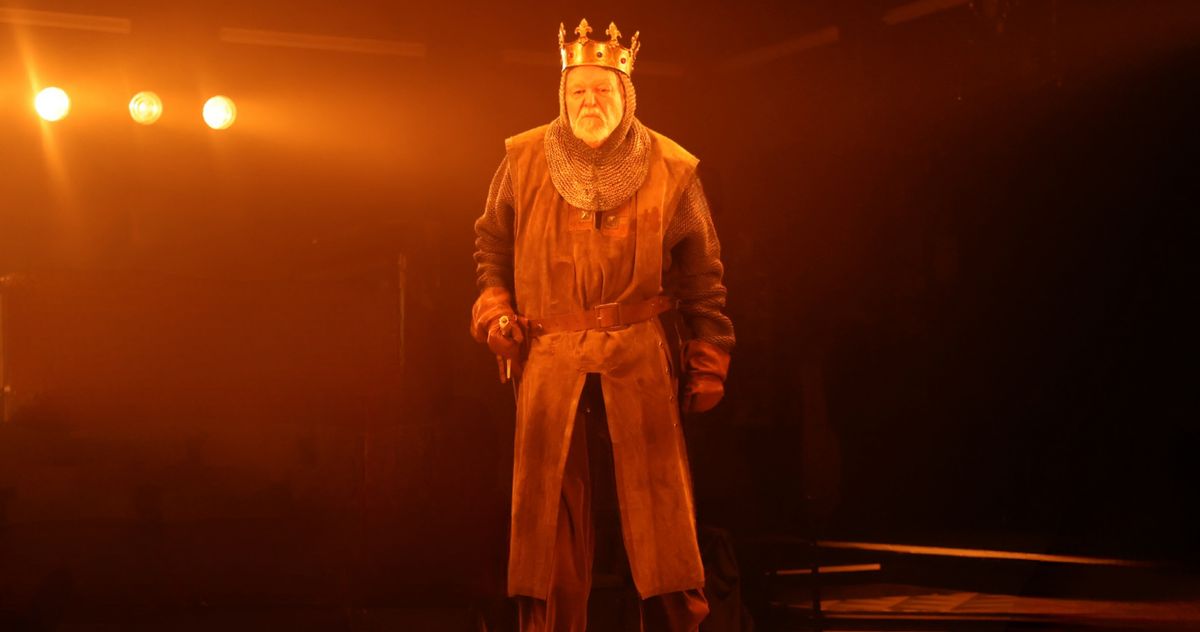Dakin Matthews as the king.
Photo: Hollis King
You don’t get many opportunities to see Shakespeare’s Henry IV Part 1, and still fewer to see Part 2. The so-called histories and their Roman numerals put people off, along with all the names (wait, there’s a person and a place called Gadshill? There’s a Bardolph and a Lord Bardolph? Help) — but oh, what we’re all missing. Taken as a single story, Henry IV is as hilarious as Shakespeare’s best comedies and as devastating as the tragedies. It’s a ripping yarn and a heartbreaking reckoning with the question of whether political leaders should, or even can, retain any shred of themselves as human beings. Even at a shaky production, it’s a treat to revel in the plays’ robust, exuberant language and to visit their vivid, expansive world — gilded and gritty, bawdy and severe.
In the staging of the duology now at Theatre for a New Audience, Eric Tucker (long known for rigorously scrappy spins on the classics with his company, Bedlam) and Dakin Matthews have certainly avoided the shakes. Their Henry IV — directed by Tucker and adapted by Matthews into a single show clocking in at just under four hours with two intermissions — is forthright and solid. Perhaps, in fact, a little too solid. Together, they’ve created a clearly plotted, crisply spoken production — dependable and on the whole well-paced with appealing sparks of theatricality throughout. What they don’t do is throw themselves all the way into the material’s glorious heights or its startlingly painful depths. “By heaven,” cries Part 1’s irresistible anti-hero, the recklessly charismatic Harry Percy, known as Hotspur, “methinks it were an easy leap, / To pluck bright honor from the pale-faced moon, / Or dive into the bottom of the deep … / And pluck up drowned honor by the locks.” In four lines, the poetry soars and plummets, travels up into the cosmos and back down into the abyss. It’s a wild rush — and it’s also, in context, wickedly funny. Hotspur isn’t just a bold young warrior given to manly metaphors; he’s also a nutball who can’t shut up. As he’s busy rattling off that gorgeous stanza, his father and uncle are actively waiting for him to stuff a sock in it.
These are the opportunities that this Henry IV misses. It’s not that the production is humorless — it could hardly manage to be, since what’s on the page is too genuinely witty and a good number of Tucker’s actors are game. But the performance as a whole rarely takes Shakespeare up on his offers to go all the way there. It contents itself with chuckles when it could cause a riot. It settles for characters of two or three shades when it could draw them in a multitude of colors. James Udom’s Hotspur is more furrow-browed than fiery, square-shouldered and intense but lacking any wryer sense of himself as a kind of clown, a streak of complex comic brilliance in the role that shouldn’t diminish it but rather endear it to us all the more. At the same time, his Pistol (one of Falstaff’s companions and a natural double for Hotspur — both spark as quickly as their names) comes across as a generic buffoon, just another blinking lackey, rather than the swaggering, hair-trigger weirdo who speechifies in questionable Latin and casually lets drop absurd gems like, “Shall dunghill curs confront the Helicons?”
The ensemble of 16, playing 40-odd characters, undoubtedly contains bright spots. Steven Epp — a former co-artistic director of Minneapolis’s Theatre de la Jeune Lune and no stranger to clowning of all stripes — speaks with a sardonic bray as Hotspur’s embittered, self-serving uncle, Worcester, and in a flustered, twittering soprano as the long-suffering, none-too-bright tavern flunky, Francis. John Keating gives an arch, reserved edge to the king’s ally Westmoreland, then turns on his heel and releases a wonderful sense of wackiness — along with an irrepressible shock of salt-and-pepper curls — as the randy, reminiscence-happy old goat Justice Shallow. Doubling as the coolly treacherous Prince John (never trust an English royal named John) and the Eastcheap roisterer Poins, Jordan Bellow is also a delight. His Poins has a shit-eating grin, a perpetual squint, and an off-kilter saunter so pronounced that he trips on the stage’s steps every time he comes up (it’s a walking gag). Still, around these more playful presences, the production as a whole paints — somewhat unusually for Tucker, though I suspect the influence may come from Matthews, an emeritus Shakespearean who also steps soberly into the title role — with a largely sedate and straightforward brush. Especially in the story’s court scenes, which contain plenty of sizzle and poignancy despite their formal milieu, I kept hearing internal echoes of Don Lockwood in Singin’ in the Rain: “Dignity, always dignity.” The joke of that refrain, of course, is that it’s a big fat fib. Here it too frequently feels like an earnest aspiration, and the show’s potential vivacity is muted as a result.
Because speaking of vivacity, and of big fat fibbers, Henry IV’s titular monarch is hardly the only reigning energy in the play. There’s also, and immortally, “that trunk of humors, that bolting-hutch of beastliness … that huge bombard of sack, that stuffed cloak-bag of guts … that villainous abominable misleader of youth” — Sir John Falstaff. Henry IV may be named after its king, but the story’s emotional arc follows the heir apparent, Prince Hal (Elijah Jones), and he is torn between two fathers — his own, the aging monarch; and his surrogate dad and incorrigible drinking-and-marauding buddy, Falstaff. Here, the eminently likable Jay O. Sanders towers and sways as “the fat knight with the great belly-doublet,” cutting the classic Orson Welles figure with a shaggy, Santa-on-a-bender mien and a healthily padded jerkin. (The costumes, which blend 15th-century flair with malleable modern base layers, are by Catherine Zuber and AC Gottlieb; I particularly liked the simple pullover hoodies, somehow reminiscent of medieval liripipe hoods or even chain mail.)
“Give me life!” Falstaff roars as he picks his way among corpses on the battlefield, and indeed, that’s what his muchness signifies. Falstaff is vitality incarnate — exuberant, excessive, grandiloquent, unashamedly self-preserving, defiant and fleshy, witty and roguish, an addict by personality and addictive to those who can’t help but love him. And such a one, for all his aloof awareness of the path that’s laid out for him in life, is Hal. But what has a king, God’s anointed on earth, to do with the messy business of living? Henry IV might be the funniest set of plays ever to be made up of two tragedies. The first is Hotspur’s — poor, reckless lionheart, unlucky enough to be born on the wrong side of the rebellion. The second is Falstaff’s. If Part 1 shows us the death of honor, Part 2 chronicles the dwindling and, ultimately, the brutal snuffing out of Sir John’s seemingly unquenchable flame. “Banish plump Jack,” the fat knight warns his sweet young prince in a moment of prophetic foolery, “and banish all the world.” Hal answers with four of the calmest, most harrowing words in all of Shakespeare — “I do, I will” — but here, in Jones’s playing, the moment falls flat. Frustratingly, just as Tucker and Matthews seem hesitant to push the envelope of Henry IV’s laughter, they also stall when it comes to exploring its grief. This Hal’s “I do” has a hint of gravity about it, but his “I will” explodes back into hammed-up razzing, a dagger clattering to the floor when it could have been leveled at the heart.
Pain and play often share space in Shakespeare’s story, like so many protons and electrons sparking off each other. But here, Tucker sidesteps real ache when he can, as in an impassioned Part 2 speech by Hotspur’s widow, Lady Percy (Cara Ricketts), to her father-in-law, Northumberland (Michael Rogers); or when Falstaff leans into the caresses of the prostitute Doll Tearsheet (also Ricketts), daring to admit to her as he does so, “I am old, I am old.” Tucker has Ricketts smother Lady Percy’s eloquent, heartbroken speech in one-note bitterness, while she plays Doll’s scene from a similarly monochromatic place of tipsy, mocking frivolity. And while these tones may pass through these women, neither gains her true fullness.
Perhaps the tendency flows outward: At the center of things, Matthews is also sticking to a narrow, if sturdy, set of tools. His grasp of the language is inarguable, but who is his Henry apart from a King with a capital K? If the plays named for him are in part an examination of the dehumanization of kingship, then how can we see both the character’s long-worn mask and flashes of what it covers? There’s shame and guilt in this man, along with deep hurt, and deep love for his son, and fear for his own soul as well as for the country he wound up governing. As he lies dying, his final advice to Hal is chilling in its combination of desperate paternal care and implicit political consequence: “My Harry,” he tells his son, “Be it thy course to busy giddy minds / With foreign quarrels; that action, hence borne out, / May waste the memory of the former days.” In other words: Go start a war somewhere and everyone will love you for it. That’s terrifying, it resonates at this very second, and it’s also the plot of Henry V. And, crucially, it’s the awful double voice of both a father — a suffering human being — and a king. Can someone be both? Shakespeare spilled some of his most potent ink over the question, and while Tucker, Matthews, and their ensemble touch that potency, there remains in their Henry IV a Falstaffian portion of fierce, funny, multifaceted life still waiting to be tapped.
Henry IV is at Theatre for a New Audience through March 2.













